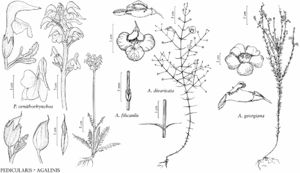Difference between revisions of "Agalinis filicaulis"
Bull. Torrey Bot. Club 40: 438. 1913.
FNA>Volume Importer |
imported>Volume Importer |
||
| (3 intermediate revisions by 2 users not shown) | |||
| Line 10: | Line 10: | ||
|special_status={{Treatment/ID/Special_status | |special_status={{Treatment/ID/Special_status | ||
|code=F | |code=F | ||
| − | |label= | + | |label=Illustrated |
}}{{Treatment/ID/Special_status | }}{{Treatment/ID/Special_status | ||
|code=E | |code=E | ||
| Line 18: | Line 18: | ||
|name=Gerardia aphylla var. filicaulis | |name=Gerardia aphylla var. filicaulis | ||
|authority=Bentham | |authority=Bentham | ||
| + | |rank=variety | ||
|publication_title=Compan. Bot. Mag. | |publication_title=Compan. Bot. Mag. | ||
|publication_place=1: 174. 1836 | |publication_place=1: 174. 1836 | ||
| Line 24: | Line 25: | ||
|name=G. filicaulis | |name=G. filicaulis | ||
|authority=(Bentham) Chapman | |authority=(Bentham) Chapman | ||
| + | |rank=species | ||
}} | }} | ||
|hierarchy=Orobanchaceae;Agalinis;Agalinis filicaulis | |hierarchy=Orobanchaceae;Agalinis;Agalinis filicaulis | ||
| Line 48: | Line 50: | ||
-->{{#Taxon: | -->{{#Taxon: | ||
name=Agalinis filicaulis | name=Agalinis filicaulis | ||
| − | |||
|authority=(Bentham) Pennell | |authority=(Bentham) Pennell | ||
|rank=species | |rank=species | ||
| Line 62: | Line 63: | ||
|publication title=Bull. Torrey Bot. Club | |publication title=Bull. Torrey Bot. Club | ||
|publication year=1913 | |publication year=1913 | ||
| − | |special status= | + | |special status=Illustrated;Endemic |
| − | |source xml=https:// | + | |source xml=https://bitbucket.org/aafc-mbb/fna-data-curation/src/2e0870ddd59836b60bcf96646a41e87ea5a5943a/coarse_grained_fna_xml/V17/V17_961.xml |
|genus=Agalinis | |genus=Agalinis | ||
|species=Agalinis filicaulis | |species=Agalinis filicaulis | ||
Latest revision as of 19:37, 5 November 2020
Stems simple or branched, 20–40(–50) cm; branches widely and laxly spreading, nearly terete, papillate proximally to glabrate distally, sometimes glaucous. Leaves appressed to strongly ascending; blade subulate to narrowly triangular, 0.8–2.1 x 0.4–0.7 mm, margins entire, siliceous, abaxial midvein scabrous, adaxial surface glabrate; axillary fascicles absent. Inflorescences paniculate, flowers 1 per node; bracts shorter than pedicels. Pedicels ascending, 3–10(–12) mm, glabrous. Flowers: calyx campanulate, tube 1.5–2.1 mm, glabrous, lobes triangular, siliceous at tips, 0.1–0.3 mm; corolla pink, without 2 yellow lines and red spots in abaxial throat, 8–11 mm, throat glabrous externally and glabrous within across bases and sinus of adaxial lobes, lobes: abaxial spreading, adaxial arching forward and overlapped resembling a keel, 1.6–4.2 mm, unequal, abaxial 2.5–4.2 mm, adaxial 1.6–2.5 mm, glabrous externally; proximal anthers parallel to filaments, distal perpendicular to filaments, pollen sacs 0.9–1.6 mm; style exserted, 6.5–7.2 mm. Capsules globular, 3–4 mm. Seeds tan, 0.5–1 mm. 2n = 28.
Phenology: Flowering mid Sep–early Nov.
Habitat: Mesic to moist longleaf pine forests, moist prairies, shallow bogs, moist roadsides, remnant wiregrass communities, borrow pits.
Elevation: 0–20 m.
Distribution
Ala., Fla., Ga., La., Miss.
Discussion
Plants of Agalinis filicaulis are among the more diminutive in the genus. The corolla with short, arching adaxial lobes that appear keeled is unique in Agalinis. This along with the weak, glaucous stems and small, solitary flowers makes it immediately recognizable.
Selected References
None.
